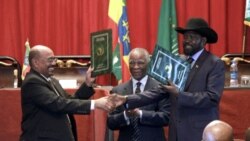Capping lengthy negotiations sponsored by the African Union, the leaders of Sudan and South Sudan have agreed to terms over important border, security and economic issues. Agreement between Sudanese President Omar Hassan al-Bashir and South Sudan’s president Salva Kiir paves the way for resuming suspended oil exports important to the economies of both nations. It is also a critical step toward peaceful resolution of the differences remaining between the neighbors and fostering greater stability and development for their citizens.
Oil production should resume in several months after needed preparations for pipelines, wells and other infrastructure. Production was suspended by South Sudan in January amid a dispute between the two countries over transit fees charged by Sudan for use of its pipelines. Future disputes will be avoided through use of a new metering system and other measures. To reduce military tensions, the leaders agreed to create a temporary demilitarized border zone between their two countries. And they are committed to resuming cross-border trade and allowing citizens from each side to move freely.
The leadership shown on both sides is an example of what is possible when nations come together in good faith and choose a brighter future for their people. It is a moment worth celebrating, but the ultimate success of the agreements will depend on the actual implementation of what has been agreed and the next steps needed in the peace process.
Resolution is needed now for the conflict and humanitarian needs in Southern Kordofan, Blue Nile and Darfur provinces in Sudan. We call on the parties to maintain their commitments and live up to the serious responsibilities to which they have agreed. The Government of Sudan and the Sudan People’s Liberation Movement-North (SPLM-N) should immediately implement the tripartite plan for humanitarian access in the Two Areas.
We also strongly urge the parties to agree on a sustainable process to resolve the final status of the disputed border area of Abyei. The United States supports the execution of all agreements reached late September and we stand with the Sudanese and South Sudanese people in pursuit of a lasting peace.
Oil production should resume in several months after needed preparations for pipelines, wells and other infrastructure. Production was suspended by South Sudan in January amid a dispute between the two countries over transit fees charged by Sudan for use of its pipelines. Future disputes will be avoided through use of a new metering system and other measures. To reduce military tensions, the leaders agreed to create a temporary demilitarized border zone between their two countries. And they are committed to resuming cross-border trade and allowing citizens from each side to move freely.
The leadership shown on both sides is an example of what is possible when nations come together in good faith and choose a brighter future for their people. It is a moment worth celebrating, but the ultimate success of the agreements will depend on the actual implementation of what has been agreed and the next steps needed in the peace process.
Resolution is needed now for the conflict and humanitarian needs in Southern Kordofan, Blue Nile and Darfur provinces in Sudan. We call on the parties to maintain their commitments and live up to the serious responsibilities to which they have agreed. The Government of Sudan and the Sudan People’s Liberation Movement-North (SPLM-N) should immediately implement the tripartite plan for humanitarian access in the Two Areas.
We also strongly urge the parties to agree on a sustainable process to resolve the final status of the disputed border area of Abyei. The United States supports the execution of all agreements reached late September and we stand with the Sudanese and South Sudanese people in pursuit of a lasting peace.






